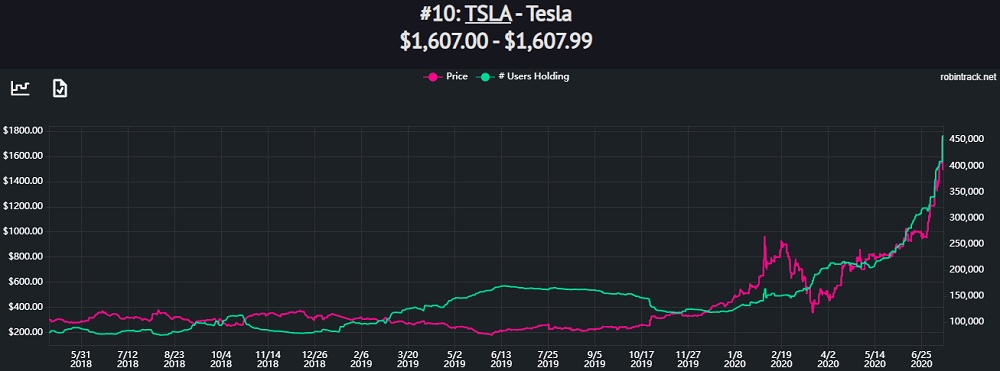The Robinhood effect: 40,000 new Tesla shareholders in four hours
One of the amazing things to behold in the capital markets over the past few months has been the near-unabated rise of Tesla shares.
NASDAQ:TSLA traded down to the low $360’s as the overall stock market tanked in March at the outset of the global Coronavirus crisis. Since then, the company has been on a meteoric rise climbing more than four-fold to above $1,500 per share (at $1,573 as of the time of writing), making its CEO Elon Musk one of the richest men on earth. (Which is somewhat ironic since Mr. Musk’s real passion seems to be travel to Mars).
Many an analyst has a take on why Tesla shares keep on truckin’ (no pun intended) in one direction. Better than expected vehicle deliveries. Lack of other good electrification investment options. Consumers’ disappointment in traditional car companies’ electric offerings. Short squeeze.
While one or more of those reasons might be true, a quick peek into how retail traders have been picking up Tesla shares certainly explains how the “demand” side of supply-demand equation for Tesla shares is clearly tilted heavily.
Call it the “Robinhood effect”.
Website Robintrack.net, which as its name hints tracks patterns among Robinhood retail stock traders (yes, there is such a thing!), pointed out that on Wednesday July 13 – a day when Tesla shares saw a 20% swing, rising more than 16% before ending the day down nearly 4% – Tesla was picked up by at 40,000 (!!) new Robinhood traders which had not yet owned the stock.

The number of Robinhood accounts which hold Tesla shares (the green line in the above chart, source: Robintrack.net) jumped from about 408,000 to above 457,000 in less than a day, between July 12 and 13. More than 10,000 new Robinhood accounts picked up Tesla shares each hour!
Entering June about 235,000 Robinhood traders had some Tesla stock in their accounts.
The run-up in Tesla’s share price, driven mainly it seems by retail traders, has put a big dent in the pockets and pocketbooks of those shorting Tesla shares – mainly institutional investors. Tesla shorts have lost more than $20 billion so far this year betting against the company.
The point of this article, however, is as per above to point out the “Robinhood effect” and what it can mean in today’s highly volatile stock market. There is a lot of retail trader money sloshing out there, and it isn’t afraid of all-time highs or “smarter” institutional traders and Wall Street analysts whom might think differently than they do.
Robinhood itself has become something of a phenomenon. The still-private Robinhood just raised another $320 million, at an elevated valuation of $8.3 billion.





